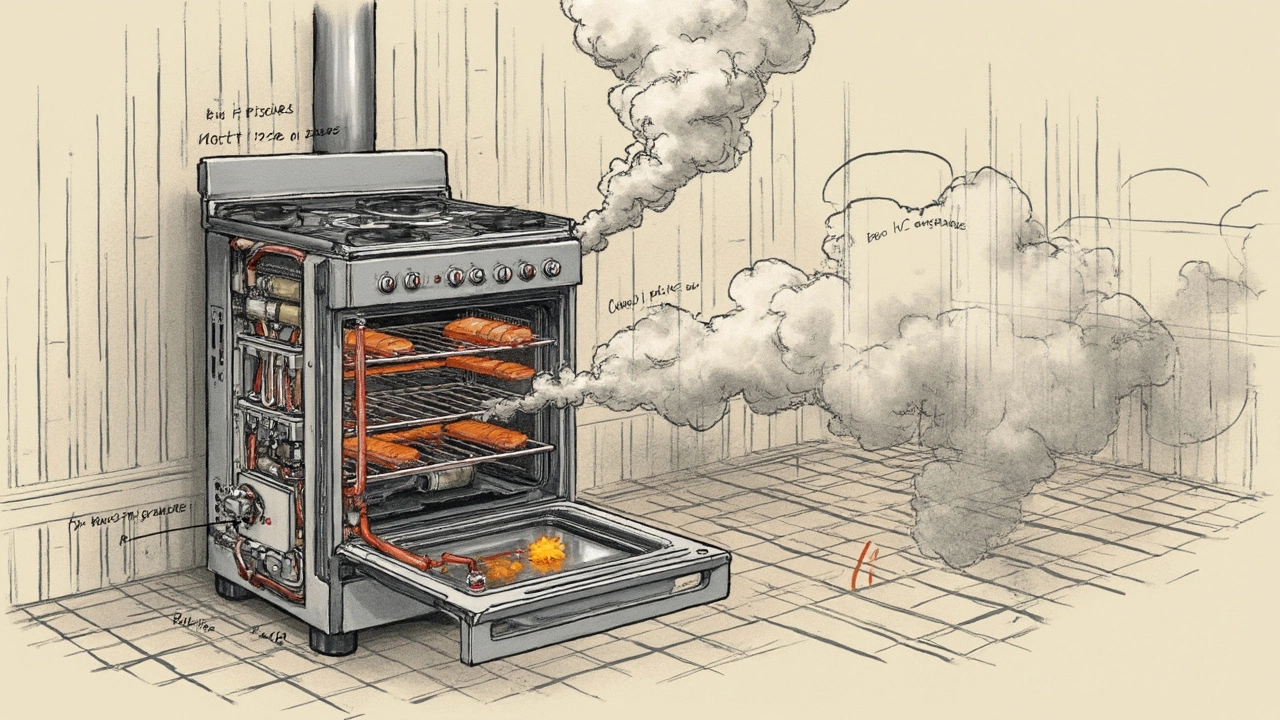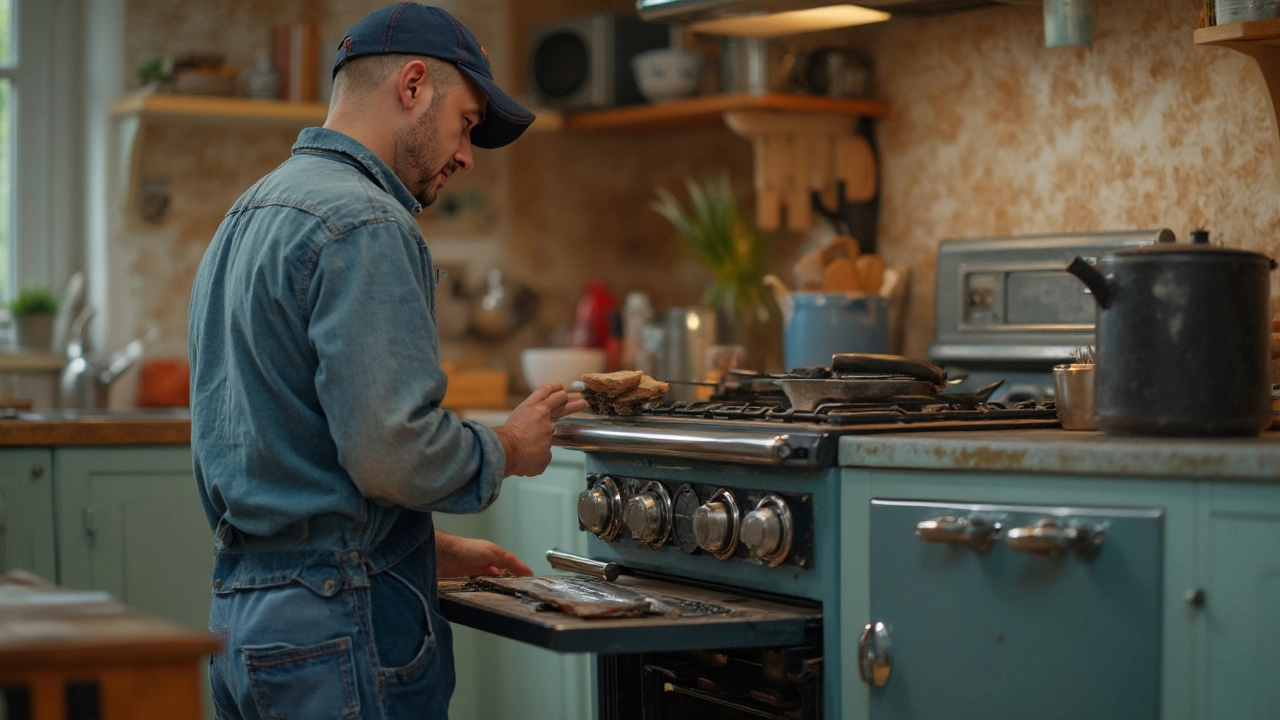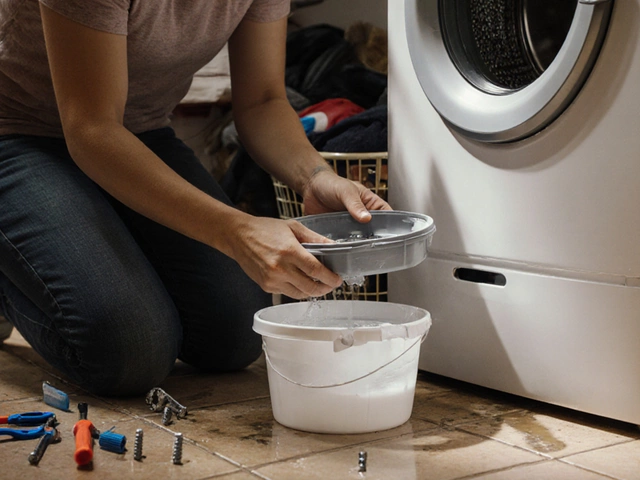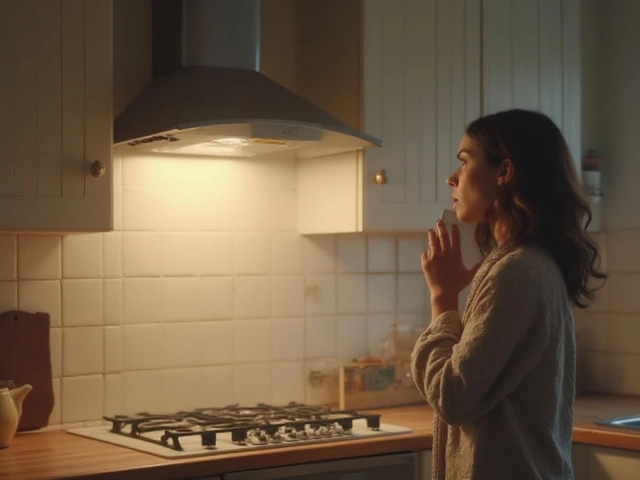Ever had your dinner plans ruined because your gas oven decided to take a nap instead of heating up the lasagna? You're not alone. Gas ovens are fantastic when they work, but sometimes they like to spring surprise malfunctions on us. The upside? A lot of these issues can be fixed without having to buy a new oven.
First thing's first, let’s run through some usual suspects when it comes to gas oven troubles. Problems like the oven not heating up properly, an oven door that refuses to stay shut, or weird noises can often be traced back to something simple. Maybe a clogged burner or a cranky thermostat. Sounds complicated? It's not as bad as it seems. With a bit of detective work and patience, you can often pinpoint the issue.
- Understanding Common Gas Oven Problems
- Signs Your Gas Oven Needs Repair
- DIY Repairs: What You Can Do Yourself
- When to Call a Professional
- Preventive Maintenance Tips
- The Future of Gas Ovens: Repair or Replace?
Understanding Common Gas Oven Problems
Gas ovens are great—until they're not. And when they decide to break down, they often do so at the most inconvenient times. But don't worry; understanding what's going wrong is the first step to fixing it.
A really common issue is the oven not heating properly. The culprits here are often the igniter or the burner. An aging igniter that doesn't generate enough heat to open the gas valve can cause this problem. A quick test? Turn on the oven and see if the igniter glows without a blast of heat. If it's glowing but the oven still feels like an icebox, you've likely found your problem.
Another equally frustrating issue is when the oven heats unevenly. This can result in one side of your pizza being perfectly golden while the other remains doughy. The usual suspects are either a faulty thermostat or a broken convection fan. If the fan isn't spinning like a DJ's turntable, we've got an issue there.
"A faulty thermostat is one of the main things homeowners overlook, and it impacts cooking consistency," says Joe Michaels, an engineer specializing in kitchen appliances.
Lastly, let's touch on gas smells when the oven is on. This is a big red flag. Always check the gas lines and connections for leaks. Use a bit of soapy water to see if bubbles pop up when the gas is on. Smelling gas? Cut the supply and call in a professional pronto.
You might find this bit of data helpful:
| Common Issue | Likely Cause |
|---|---|
| Not heating | Igniter issues |
| Uneven cooking | Thermostat malfunction |
| Gas smell | Leak in the line |
Knowing these problems can help you troubleshoot and decide whether to roll up your sleeves or call in an expert.
Signs Your Gas Oven Needs Repair
Gas ovens are great when they're working fine, but they can also show signs of needing a little TLC. It's crucial to catch these early to avoid bigger headaches down the road.
One big sign is when your gas oven just won't heat up enough or takes way too long to get hot. This might be a result of a worn-out igniter, and if it's not lighting the gas properly, your oven's not gonna give you the heat you need. Sometimes, you might even notice that food isn’t cooking evenly, leaving you with a pizza that’s crispy on one side and raw on the other.
- Strange noises or smells: Normally, your oven shouldn't be too loud. Odd hissing or clicking? That’s not normal. And let's not ignore weird gas smells—a strong indicator something's off.
- Frequent cycling: Another sign is when your oven keeps turning on and off. This could be due to a faulty thermostat that's not accurately reading the oven's temperature.
- Unresponsive controls: If turning the knobs does nothing or the display is blank, the controls might be faulty. This could be down to electrical issues that might not be obvious at first glance.
Keep an eye out for these signs so you can catch problems early and get back to baking without a hitch. Doing so might save you from more expensive repairs or the headache of shopping for a new one. Sometimes all it takes is replacing a small part instead of going for a whole new appliance repair project.
DIY Repairs: What You Can Do Yourself
If you've got a knack for fiddling with home appliances, tackling your gas oven's problems yourself might not be as daunting as it seems. With some basic tools and patience, you could save yourself a call to the repairman.
Start with something simple: cleaning. A lot of times, problems stem from dirt and grime clogging things up. Grab that favorite cleaner or a bit of white vinegar and give your oven a good wipe down. Especially check the burner ports for blockages.
Next on the list is checking the thermostat. An oven that’s not heating properly could be suffering from a faulty thermostat. You can test this by placing an oven thermometer inside and comparing the temperature readings to the settings.
If you're feeling adventurous, try replacing the igniter if your oven refuses to light up. Here's a quick run through:
- First, make sure the oven is off and cool. Safety first!
- Locate the igniter. It's usually a rectangular part near the back or side of the oven.
- Disconnect it carefully, noting how it’s wired.
- Get a replacement. Make sure it's the right model for your oven.
- Connect the new igniter and screw it back into place.
For an oven door that won't shut, often it's the hinges causing the issue. Tightening them or replacing them is usually all it takes.
A little heads up on replacement parts: if you're ordering online, double-check that you're getting the right parts that match your oven model. This small step can save a lot of headaches later on.
Finally, a classic troubleshooting step: reset your oven. A quick off and on, like rebooting your computer, can sometimes work wonders.
Here’s a quick peek at potential DIY areas and their fixes:
| Issue | DIY Fix |
|---|---|
| Clogged Burners | Clean with vinegar |
| Temperature Discrepancy | Calibrate Thermostat |
| Igniter Not Working | Replace Igniter |
| Oven Door Won't Close | Fix or Replace Hinges |
So, roll up those sleeves and dig into these gas oven repair tasks. It’s not just about saving money, but also about that satisfaction of fixing something yourself. Remember, if the job feels too complex, reaching out to a professional isn’t a defeat—sometimes it’s just smart.

When to Call a Professional
Alright, so you've tinkered with your gas oven but it's still not cooperating. It might be time to call in the pros. Here are some clear signs that you should put the wrench down and grab the phone.
First off, if you've got a gas leak, it's a no-brainer. Get out of the house and call a professional immediately. Safety first, folks! A common sign of a gas leak is the smell of rotten eggs, so keep your sniffer on high alert.
Another red flag is if the oven doesn’t ignite at all, or if the flame is a weird color like yellow instead of a steady blue. These could mean that parts like the igniter or gas valves are on the fritz, and tampering with these without the right know-how could make things worse.
If your oven's still under warranty, you really shouldn’t mess with things beyond basic cleaning and maintenance. Most warranties will void if unauthorized repairs are made, which could leave you footing a bigger bill later on.
- Repeated Issues: If problems keep cropping up even after you’ve fixed them, then something may be off under the hood that requires professional eyes.
- Complex Electrical Problems: If you aren't confident dealing with the electrical components of the oven, it's smart to call in someone who is.
| Symptom | Possible Issue |
|---|---|
| No Ignition | Failed Igniter or Gas Valve Issues |
| Flame Color Issues | Aeration or Burner Issues |
Remember, professionals not only have the skills but also the required tools to diagnose and fix things efficiently. Plus, most reputable services guarantee their work, ensuring your oven stays up and running smoothly after repairs. It's often worth the peace of mind.
Preventive Maintenance Tips
Keeping your gas oven in good shape isn't just about fixing things when they break. Regular maintenance can prevent those annoying breakdowns and make sure your oven runs smoothly longer. Who wouldn't want their trusty kitchen companion to stay reliable?
For starters, it's key to keep the oven clean. Grease and food spills can clog burners and create uneven heating. Give the interior a good scrub with gentle cleaners - harsh chemicals can be your oven’s worst enemy. If you've got grates, those can usually go in the dishwasher for an easy clean.
- Check the Burners Regularly: Over time, bits of food or grease can block the burner openings. Make it a habit to inspect and clean them every couple of months.
- Inspect the Door Seal: A faulty seal lets heat escape, which means longer cooking times. Ensure the seal is tight and in good condition. If you see warping or cracks, it might be time for a replacement.
- Calibrate the Thermostat: If your recipes are taking longer to cook, the temperature might be off. You can use an oven thermometer to check if it matches the set temperature. If it's off, recalibration might be needed.
- Ventilation Check: Make sure the ventilation system isn't blocked. Proper airflow is crucial for safety and performance.
A little upkeep goes a long way! If something does seem off, and you're hesitant to tackle it on your own, it might be time to call in a pro. Remember, regular maintenance today can save you a big chunk of repair fees tomorrow.
The Future of Gas Ovens: Repair or Replace?
Deciding whether to repair or replace your gas oven can feel like a real head-scratcher, especially when your appliance starts playing hard-to-get. So how do you make the call without feeling like you're throwing money down the drain?
First, consider the age of your oven. Most gas ovens last around 10 to 15 years. If yours is closing in on a decade and a half, it might be time to start browsing for a new one. Repairs can sometimes feel like putting a band-aid on a bigger underlying problem.
On the flip side, if your oven is only a few years old and the issues seem minor, like a malfunctioning thermostat or a faulty igniter, repair is often the better and cheaper choice. Parts replacements in these cases aren't usually expensive, and you’ll get a few more years out of your appliance.
- Costs involved: Weigh the repair estimate against the cost of a new oven. If the repair is more than half the cost of buying new, going for a replacement might be smarter.
- Energy efficiency: Newer models can also save you on utility bills in the long run since they're typically more energy-efficient.
Finally, think about environmental impact. Repairs keep a big chunk of metal out of the landfill, so if your oven has life left in it with a simple fix, that’s a point for repair.
Whether you decide to repair or replace, keeping an eye on the age, cost, and efficiency can guide you towards a smart decision. It’s all about ensuring you get the most bang for your buck!





